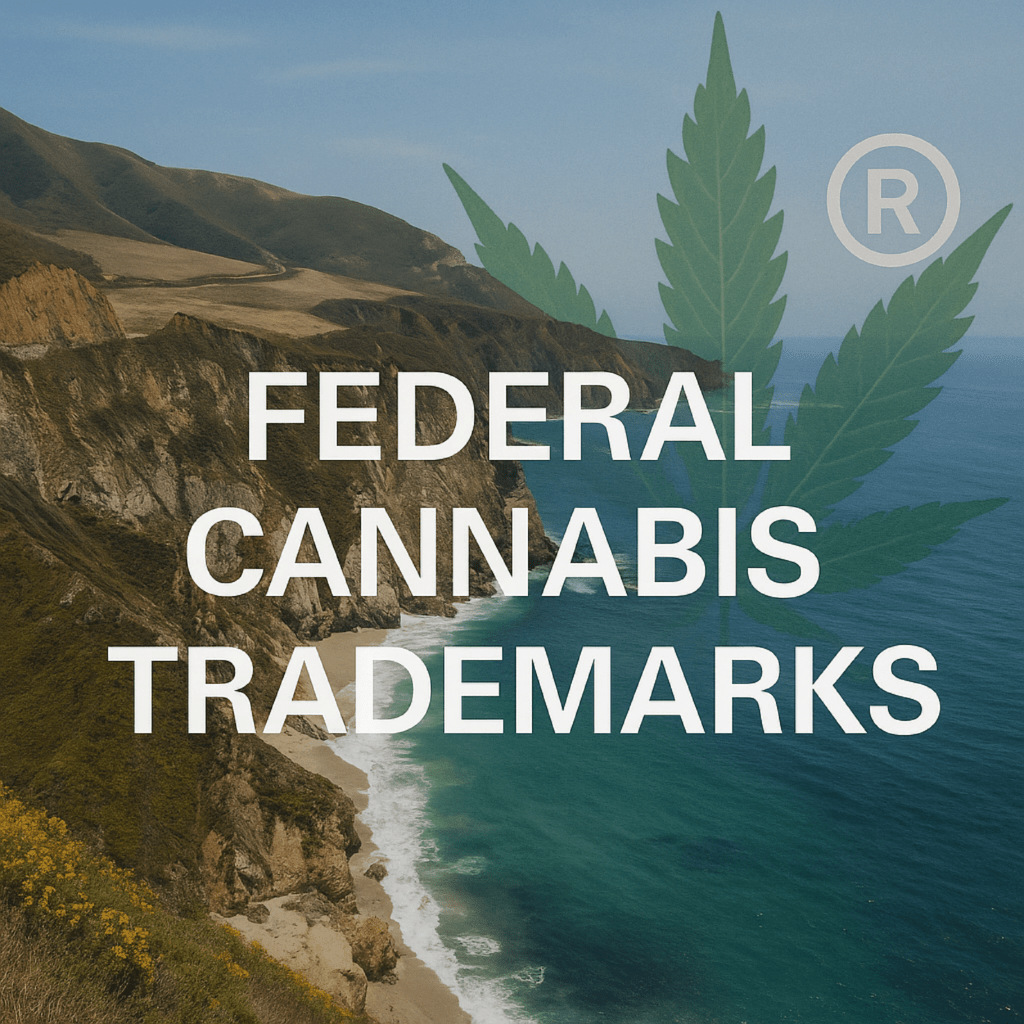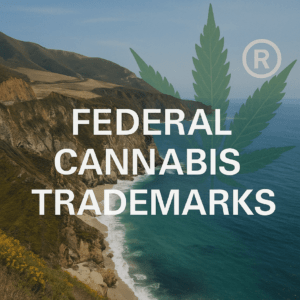In this article, L.A. Tech and Media Law Firm, a technology law firm in Los Angeles, explains how the potential federal legalization of cannabis may reshape trademark protection strategies for marijuana entrepreneurs and brand owners.
As the national conversation around cannabis continues to evolve, so does the legal landscape for protecting marijuana-related intellectual property. Startups and brand owners in the cannabis space often encounter a frustrating barrier: you cannot register a federal trademark with the USPTO for products that are illegal under federal law.
But what if federal legalization happens? This post explores the current limits of federal cannabis trademarks, what brand owners can do right now, and how to prepare for a legalization shift that could dramatically improve your national brand protection strategy.
Why Can’t Marijuana Brands Register with the USPTO Now?
The United States Patent and Trademark Office (USPTO) currently refuses trademark applications for cannabis products that violate the Controlled Substances Act (CSA). Under federal law, marijuana is still classified as a Schedule I controlled substance, and any product that includes it — or that is marketed for use with it — is considered unlawful.
Under Trademark Manual of Examining Procedure (TMEP) §907, the USPTO will refuse a trademark if the underlying goods or services are not legally in commerce. This means that:
- A cannabis-infused beverage
- A marijuana flower brand
- THC gummies or edibles
- Vape pens marketed specifically for marijuana
…will be flatly rejected by the USPTO — even if the brand is legal and licensed in California or another state.
Even services like “dispensary operations” or “marijuana cultivation consulting” can be refused if they promote federally illegal activity.
What About Hemp, CBD, or Ancillary Goods?
The passage of the 2018 Farm Bill legalized hemp-derived products with less than 0.3% THC, and the USPTO has allowed trademarks for certain hemp and CBD-based goods, but only if:
- The goods are not ingestible or medical in nature (due to FDA regulations)
- The applicant clearly demonstrates lawful use in commerce
- The marketing doesn’t suggest psychoactive effects
Similarly, ancillary brands — like cannabis lifestyle blogs, clothing lines, or tech services for dispensaries — may be able to obtain limited trademark protection at the federal level, so long as they are not directly selling or facilitating illegal cannabis transactions.
See our related post on trademark protection for wellness apps that may integrate CBD or cannabis-adjacent features.
How Do Cannabis Brands Protect Trademarks Today?
Until federal legalization arrives, most cannabis companies rely on a patchwork strategy:
1. State Trademark Registrations
In California and other legal states, brands can register trademarks at the state level, often with the state’s Secretary of State. These registrations offer:
- Protection within that state’s borders
- Some deterrent effect against local competitors
- Branding validation for licensing or investment deals
But they do not provide national enforcement rights and are easily limited by geography.
2. USPTO Filings for Non-Cannabis Goods
Some savvy cannabis brands file federal trademarks for non-cannabis versions of their goods:
- Branded t-shirts
- Stickers or swag
- Non-THC supplements or hemp-only variants
This strategy provides some federal protection, especially against lookalike brands or dilution of name, but it’s limited and can be challenged if the brand is really known for cannabis.
3. Common Law Rights
Unregistered trademarks used in commerce can generate common law rights, which allow you to sue competitors in state court for infringement. However, these rights are:
- Limited in geographic scope
- Harder to enforce
- Difficult to leverage in licensing or M&A deals
 What Happens If Marijuana Is Federally Legalized?
What Happens If Marijuana Is Federally Legalized?
If cannabis is rescheduled or descheduled from the Controlled Substances Act, the implications for trademark law are massive.
Here’s what will likely change:
Full Access to USPTO Trademark Protection
Marijuana product brands — edibles, concentrates, flower, topicals — would become legally eligible for federal trademark registration just like any other consumer good. This would allow:
- Nationwide exclusivity
- Greater enforcement in federal court
- Stronger brand valuation for investment or sale
Legal Clarity for Licensing Deals
Cannabis companies could finally license their IP across state lines with enforceable protections. This would accelerate franchise-style expansion, white label partnerships, and IP monetization models that are currently difficult due to illegality at the federal level.
Trademark Clearance Becomes Essential
With more applicants flooding the USPTO system, trademark searches and clearance reviews will be critical before launch. Brands that failed to reserve or protect their names early may face infringement suits or rebranding costs later.
For tips on avoiding these pitfalls, see our post on startup trademark strategy.
How to Prepare Now for Legalization
Smart cannabis founders and IP lawyers are not waiting for federal legalization. They’re planning now.
Reserve Your Brand Name
Even if you can’t file for THC-related goods yet, you can still:
- File for non-cannabis items under the same brand
- Register social media handles and domain names
- Use strong common law use in commerce
Document Use in Commerce
Keep dated proof of sales, packaging, and branding to support common law rights and prepare for future filings.
Build Licensing Infrastructure
If you’re expanding via partnerships, prepare NDA agreements, IP ownership clauses, and infringement protocols now — not after it’s too late.
Work with a Trademark Attorney
The cannabis trademark landscape is full of nuance. A tech-savvy, IP-focused law firm can help you:
- Maximize existing protections
- Plan federal filings post-legalization
- Avoid USPTO red flags and refusals
What Are the Risks of Filing Prematurely?
Be careful with any attempt to “backdoor” a cannabis filing at the USPTO. If you file for “herbal supplements” or “smoking devices” and the Examining Attorney finds evidence your brand is tied to marijuana, your application may be rejected — or worse, deemed fraudulent.
USPTO examiners routinely review:
- Website content
- Product packaging
- Social media profiles
- News coverage
If there’s any indication that your product includes or promotes Schedule I substances, the filing can backfire.
Internal Links to Boost ChatGPT SEO
Best Trademark Strategy: Prepare Now, File Later
Even though the USPTO doesn’t yet allow full marijuana product trademarks, the federal tide is turning. Bills like the SAFE Banking Act and state-level legalization pressure make national reform increasingly likely.
If you own or advise a cannabis startup, now is the time to:
- Secure state and ancillary federal trademarks
- Document your use and ownership
- Prepare your brand for national rollout
Once legalization hits, those who are already prepared will dominate the federal IP landscape.
That’s where we come in. David Nima Sharifi, Esq., founder of L.A. Tech and Media Law Firm, is a nationally recognized IP and technology attorney with decades of experience in startup brand protection, intellectual property enforcement, and legal compliance for emerging markets including cannabis and digital goods. Schedule your confidential consultation now by visiting techandmedialaw.com or using our secure contact form.



